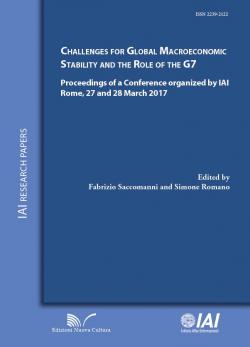Challenges for Global Macroeconomic Stability and the Role of the G7
In view of the Italian Presidency of the Group of Seven (G7) in 2017, the Istituto Affari Internazionali (IAI) conducted a research project on “Major Challenges for Global Macroeconomic Stability and the Role of the G7” together with a major policy think tank in each of the other G7 member countries: Center for International Governance Innovation (CIGI, Canada); Centre d’Etudes Prospectives et d’Information Internationales (CEPII, France); Kiel Institute for the World Economy (IfW, Germany); Japan Institute for International Affairs (JIIA, Japan); Royal Institute for International Affairs (Chatham House, United Kingdom); Peterson Institute for International Economics (PIIE, United States). The project covered the following three subjects, representing major challenges for G7 policy-makers: macroeconomic policy coordination; international trade relations; global financial stability. Each participating think tank prepared a paper addressing all or some of the issues from the perspective of its own country, outlining areas of possible consensus for joint actions to be achieved within the Group and offering independent policy recommendations for the G7 deliberations. The seven papers have been presented at an international conference held in Rome on 27-28 March 2017 and have been discussed by a broad range of experts from academia and international institutions. The proceedings of the conference are presented in this volume. A broad consensus emerged from the T7 papers and the contributions of the discussants on the need to reduce policy uncertainty, preventing a resurgence of financial tensions in capital and foreign exchange markets. Boosting public investment in infrastructures and new technologies; defining a “better trade agenda” with adequate social protections and completing the financial regulatory reform were also indicated as top priorities for the G7.
Proceedings of the international conference on “Major Challenges for Global Macroeconomic Stability. The Role of the G7”, organized in Rome on 27-28 March 2017 by the Istituto Affari Internazionali (IAI) with the support of the Italian Ministry of Foreign Affairs and International Cooperation, the Bank of Italy, Intesa Sanpaolo and the Compagnia di San Paolo-International Affairs Programme.
-
Details
Roma, Nuova Cultura, May 2017, 203 p. -
Issue
25 -
ISBN/ISSN/DOI:
978-88-6812-859-3
Introduction
“Reduce Policy Uncertainty, Now”. Recommendations from Seven Think Tanks to G7 Leaders, Fabrizio Saccomanni, p. 7-23
Part I. T7 Policy Papers
1. Co-ordination in Tense Times: Issues for the G7, Anne-Laure Delatte and Sébastien Jean (CEPII), p. 27-50
2. The G7’s Task for Restoring Growth and Stability, Stephen Pickford and Paola Subacchi (Chatham House), p. 51-60
3. A Proposal for G7/G20 Policy Coordination to Strengthen Global Productivity and Output Growth, Malcolm D. Knight (CIGI), p. 61-71
4. A Coordinated Approach to Foster Sustainable Growth and Financial Stability, Fabrizio Saccomanni and Simone Romano (IAI), p. 63-89
5. Reconfirming the Very Basis of G7 Cooperation, Yoichi Otabe (JIIA), p. 91-94
6. Germany Prioritizes the Long-term Goal of Sustainability over the Short-term Goal of Revitalizing the World Economy, Rolf Langhammer, Wolfgang Lechthaler, Stefan Reitz and Mewael F. Tesfaselassie (IfW), p. 95-103
7. G7 Economic Cooperation in the Trump Era, C. Fred Bergsten, Edwin M. Truman and Jeromin Zettelmeyer (PIIE), p. 105-122
Part II. Comments by Discussants
First Session: Macroeconomic Policy Coordination
1. Menzie D. Chinn, p. 125-129
2. Giancarlo Corsetti, p. 131-135
3. Douglas Laxton, p. 137-144
Third Session: Financial Stability
4. Claudio Borio, p. 145-151
5. Luigi Guiso, p. 153-159
Fourth Session: The Role of the G7 in the Global Governance
6. Iain Begg, p. 161-163
7. Domenico Lombardi, p. 165-166
8. William R. White, p. 167-177
Part III. Keynote Speeches
1. Financial Market Volatility and Global Policy Uncertainty: a Conundrum, Ignazio Visco, p. 181-189
2. Priorities for the Italian Presidency of the G7, Raffaele Trombetta, p. 191-193
Annex
Contributors, p. 197-199
Conference Programme, p. 201-203



